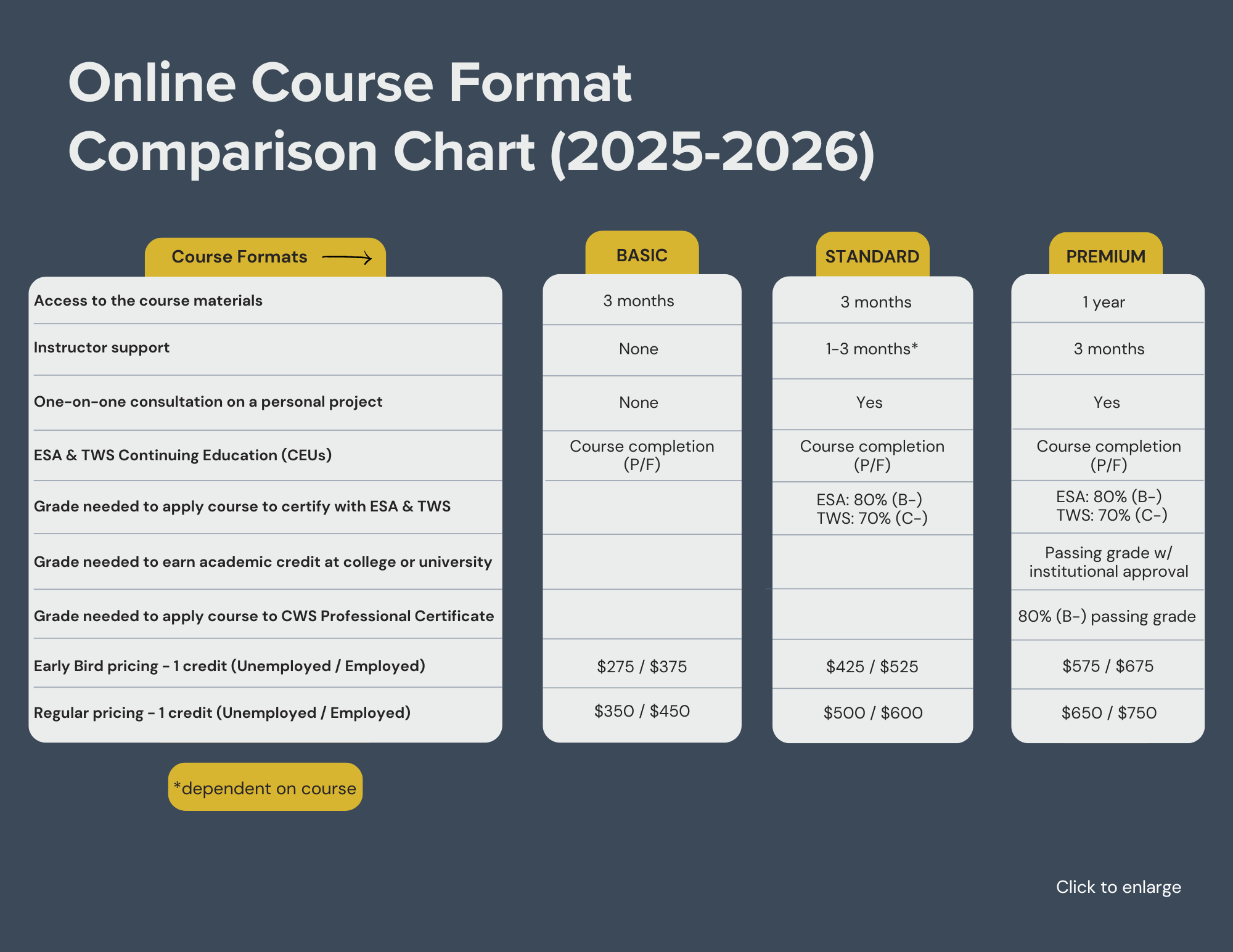-
Conservation planning happens at multiple scales from site-specific to transcontinental. While all conservation actions on the ground must eventually be applied at the site scale, the “landscape-scale” has been recommended for decades as a suitable scale for planning. The landscape scale brings ecological and socioeconomic context to inform decisions by understanding ecological connections and flows, population-level information about species, human stressors affecting sites but originating outside of them, and policy. This course will explore the key concepts and some tricky challenges of conducting conservation planning at the landscape scale, including how site-scale implementing actions can flow from a landscape-scale plan. The course will draw on the Conservation Standards and other frameworks but will address the multi-disciplinary needs and tools of landscape planning, including spatial analyses and optimization, incorporating socioeconomic factors and community input, the importance of partners, and how to sustain what must be a dynamic effort into the future. Ten guest instructors (live or pre-recorded) from multiple organizations around the world will augment the course with their specific expertise and experience.
-
Course materials available starting September 22, 2025.
STANDARD and PREMIUM formats also include:
Live (recorded) meetings September 24 – October 22, 2025; 11:00 a.m. – 1:00 p.m. EDT on Wednesdays and Fridays each week (except October 8). Exact dates are: 9/24, 9/26, 10/1, 10/3, 10/10, 10/15, 10/17, and 10/22.
Instructor support September 22 – 5 November 5.
See TOPICS & LEARNING OUTCOMES below for the details about guest lecturers each week!
-
Open Standards for the Practice of Conservation course, equivalent course, or practical experience applying the standards is preferred but students may review the Open Standards in advance.
-
Module 1: Introduction to Landscape-Scale Conservation Planning and Key Planning Frameworks
Define landscape planning
Identify available landscape planning frameworks
Guest instructor: Tom Miewald, Program Director 1000 Landscapes for 1 Billion People (Ecoagricultural Partners)
Module 2: Choosing an Appropriate Landscape Boundary
Identify important factors in defining a landscape boundary
Define appropriate landscape boundaries given specific biogeophysical and sociopolitical context
Guest instructor: Hannah Grice, Operations Manager, LandScale (Rainforest Alliance)
Module 3: Key Processes in Landscape Planning & Integrating Interested Parties
Identify the key processes for conducting landscape planning
Translate the Conservation Standards processes for setting the scope, vision, and conservation targets suitable to a landscape’s needs and context
Plan for the integration of interested parties and grassroots organizations
Guest instructors: Maya Machamer, Principal - Community Resilience, ISET-International; Kevin Essington, Founder, City Greener Strategies.
Module 4: Incorporating Socioeconomic Considerations in Multi-Objective Landscape Planning
Identify key socioeconomic considerations in landscape planning
Plan for achieving multiple objectives across environmental and socioeconomic needs
Guest instructor: Willem Ferwerda, Founder, Commonland
Module 5: Identifying Appropriate Targets, Data, and Tools for Your Needs and Capacity
Identify factors influencing target selection at a landscape scale
Define data needs for targets and useful tools
Select ecological and cultural targets appropriate for a landscape
Guest instructors: Dr. Jen McGowan; and Jamie Faselt, Conservation Science Specialist, Center for Large Landscape Conservation
Module 6: Technical Approaches for Assessing Current Conditions and Future Trends
Identify processes, data, and tools for assessing current conditions and future trends
Define how outputs of these assessments influence planning
Guest instructors: Pat Comer, Founder, Comer Ecology; Dr. Pete Cutter, Director of Program Coordination and Technical Services, RECOFT
Module 7: What’s in a Plan and How is it Implemented?
Identify the key components of a landscape plan
Define requisites for landscape plans to facilitate implementation
Guest instructors: Dr. Jen McGowan
Module 8: Building Partnerships and Creating a Dynamic Assessment & Planning Process
Identify key partners and communicate the value of landscape planning
Define a partnership model to help maintain a dynamic assessment and planning process
Guest instructors: Hannah Grice, Operations Manager, LandScale (Rainforest Alliance); and John Buchanan, Vice President Sustainable Production, Conservation International
COURSE OPTIONS & INFORMATION (Review chart above, then click below)
-
FORMAT:
3 months of access to course materials
Recordings of live meetings posted
CONTINUING EDUCATION:
16 CEUs with The Wildlife Society (go to our Continuing Education Page for more details)
-
FORMAT:
3 months of access to course materials as you work at your own pace
Get instructor support for the 3-month term via email, discussion threads, group meetings, and one-on-one appointments
After working through the course materials, set up an optional meeting with the instructor to discuss your own personal project from work or school
CONTINUING EDUCATION:
16 CEUs with The Wildlife Society
Go to our Continuing Education Page for more details
CERTIFICATIONS:
Earn 1 credit toward certification as an Associate/Certified Wildlife Biologist® (at any level) with The Wildlife Society
Course qualifies as a core-curriculum credit in the Conservation Planning Certification program.
Learn at your own pace (watch prerecorded lectures and videos, read papers, and participate in discussions) with instructor support as needed.
-
CONTINUING EDUCATION:
16 CEUs with The Wildlife Society (go to our Continuing Education Page for more details)
CERTIFICATIONS:
Earn 1 credit towards a professional certificate in Conservation Planning with CWS
ACADEMIC CREDIT:
Earn 1 academic credit (go to our Academic Credit Page for details)
Earn an additional 1-2 academic credits with an Applied Project
Learn at your own pace (watch prerecorded lectures and videos, read papers, and participate in discussions) with instructor support as needed.
INSTRUCTOR
SCHOLARSHIPS
Full scholarships are available to participants from countries designated as “lower income” and “lower middle income” in the World Bank List of Economies. Please see our CWS World Scholars Program page for details.
CANCELLATION POLICY
Cancellations 30 days or more before the start date are not subject to cancellation fees. Cancellations <30 days before the start date are subject to a 50% cancellation fee. No refunds once the course begins.




